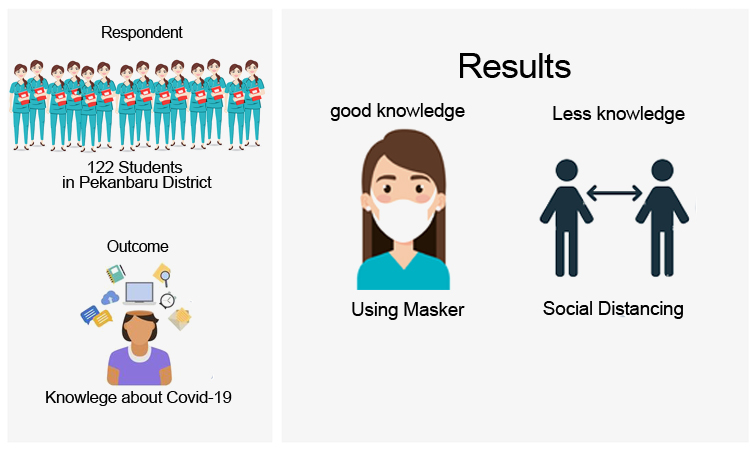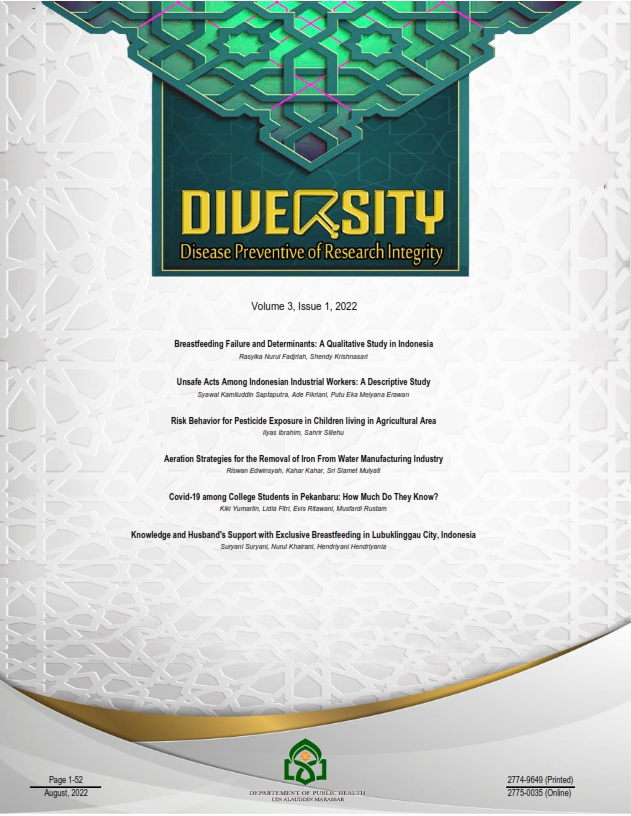Covid-19 among College Students in Pekanbaru: How Much Do They Know?
Abstract
Coronavirus Disease 2019 or called Covid-19 which is the cause of a public health emergency, is a new type of virus that has never been previously identified in humans and has no known transmitter. The Covid-19 pandemic is a health problem due to high morbidity and mortality cases. The purpose of the study was to describe student knowledge about Covid-19 at the Helvetia Midwifery Academy Pekanbaru. This type of research was a quantitative analytic descriptive design. The population in this study was 122 female students with a total sampling technique. Data were collected using a questionnaire sheet and analyzed univariately. The results showed that the majority of Helvetia Midwifery Academy students' knowledge about Covid-19 was 66.4% less. This study found that there were still many female students who had less knowledge about Covid-19, especially in terms of maintaining distance. Respondents are expected to increase their knowledge by reading, finding out, and following the development of information related to Covid-19 on trusted social media in order to break the chain of transmission of Covid-19.

Downloads
References
Akdeniz, G., Kavakci, M., Gozugok, M., Yalcinkaya, S., Kucukay, A., & Sahutogullari, B. (2020). A survey of attitudes, anxiety status, and protective behaviors of the university students during the COVID-19 outbreak in Turkey. Frontiers in psychiatry, 11, 695. https://doi.org/10.1371/journal.pone.0244350
Aula, S. K. N. (2020). Peran Tokoh Agama Dalam Memutus Rantai Pandemi Covid-19 Di Media Online Indonesia. Living Islam: Journal of Islamic Discourses, 3(1), 125-148. http://ejournal.uin-suka.ac.id/ushuluddin/li/article/view/2224
Cao, W., Fang, Z., Hou, G., Han, M., Xu, X., Dong, J., & Zheng, J. (2020). The psychological impact of the COVID-19 epidemic on college students in China. Psychiatry research, 287, 112934. https://doi.org/10.1016/j.psychres.2020.112934
Carolan, C., Davies, C. L., Crookes, P., McGhee, S., & Roxburgh, M. (2020). COVID 19: Disruptive impacts and transformative opportunities in undergraduate nurse education. Nurse Education in Practice, 46, 102807. https://doi.org/10.1016/j.nepr.2020.102807
Case, D. O., & Given, L. M. (2016). Looking for information: A survey of research on information seeking, needs, and behavior. https://books.google.co.id/books?id=IAYvDAAAQBAJ&lpg=PP1&ots=Y_TQgzjLF3&lr&pg=PR8#v=onepage&q&f=false
Chesser, A., Drassen Ham, A., & Keene Woods, N. (2020). Assessment of COVID-19 knowledge among university students: implications for future risk communication strategies. Health Education & Behavior, 47(4), 540-543. https://doi.org/10.1177%2F1090198120931420
Damayanti, R. A., & Bachtiar, A. (2020). Kesiapan Mahasiswa Kesehatan terhadap Penerapan Pendidikan Interprofesional di Indonesia. Interest: Jurnal Ilmu Kesehatan, 9(1), 16-28. https://doi.org/10.37341/interest.v9i1.184
Głąbska, D., Skolmowska, D., & Guzek, D. (2020). Population-based study of the influence of the COVID-19 pandemic on hand hygiene behaviors—Polish adolescents’ COVID-19 experience (PLACE-19) study. Sustainability, 12(12), 4930. https://doi.org/10.3390/su12124930
Gonzalez, T., De La Rubia, M. A., Hincz, K. P., Comas-Lopez, M., Subirats, L., Fort, S., & Sacha, G. M. (2020). Influence of COVID-19 confinement on students’ performance in higher education. PloS one, 15(10), e0239490. https://doi.org/10.1371/journal.pone.0239490
Hatabu, A., Mao, X., Zhou, Y., Kawashita, N., Wen, Z., Ueda, M., & Tian, Y. S. (2020). Knowledge, attitudes, and practices toward COVID-19 among university students in Japan and associated factors: An online cross-sectional survey. PLoS One, 15(12), e0244350. https://doi.org/10.1371/journal.pone.0244350
Holmes, E. A., O'Connor, R. C., Perry, V. H., Tracey, I., Wessely, S., Arseneault, L., Ballard, C., Christensen, H., Cohen Silver, R., Everall, I., Ford, T., John, A., Kabir, T., King, K., Madan, I., Michie, S., Przybylski, A. K., Shafran, R., Sweeney, A., Worthman, C. M., Bullmore, E. (2020). Multidisciplinary research priorities for the COVID-19 pandemic: a call for action for mental health science. The lancet. Psychiatry, 7(6), 547–560. https://doi.org/10.1016/S2215-0366(20)30168-1
Kadam, S. S., Bagle, T. R., & Baviskar, P. A. (2018). Utilization of internet by undergraduate medical students. National Journal of Physiology, Pharmacy and Pharmacology, 8(1), 1-6. https://www.doi.org/10.5455/njppp.2018.8.0515422072017
Kementerian Kesehatan RI (2020). Pedoman Pencegahan dan Pengendalian Coronavirus Disease (COVID-19). Germas, 0–115. https://covid19.kemkes.go.id/protokol-covid-19/kmk-no-hk-01-07-menkes-413-2020-ttg-pedoman-pencegahan-dan-pengendalian-covid-19/
Liu, S., Yang, L., Zhang, C., Xiang, Y. T., Liu, Z., Hu, S., & Zhang, B. (2020). Online mental health services in China during the COVID-19 outbreak. The lancet. Psychiatry, 7(4), e17–e18. https://doi.org/10.1016/S2215-0366(20)30077-8
Ma, Q. X., Shan, H., Zhang, H. L., Li, G. M., Yang, R. M., & Chen, J. M. (2020). Potential utilities of mask‐wearing and instant hand hygiene for fighting SARS‐CoV‐2. Journal of medical virology, 92(9), 1567-1571. https://doi.org/10.1002/jmv.25805
Maulana, A. M. R. (2020). Pandemi dalam Worldview Islam; Dari Konsepsi ke Konspirasi. Tribakti: Jurnal Pemikiran Keislaman, 31(2), 307-323 https://doi.org/10.33367/tribakti.v31i2.1232 .
Pemerintah Provinsi Riau. (2020). Riau Tanggap COVID-19. https://corona.riau.go.id/
Qiu, J., Shen, B., Zhao, M., Wang, Z., Xie, B., & Xu, Y. (2020). A nationwide survey of psychological distress among Chinese people in the COVID-19 epidemic: implications and policy recommendations. General psychiatry, 33(2). https://doi.org/10.1136%2Fgpsych-2020-100213
Rantala, A., Enwald, H., & Zinn, S. (2019). Web-based health information seeking: a small-scale comparative study between Finnish and South African university students. Library Hi Tech. https://doi.org/10.1108/LHT-08-2018-0109
Rohmah, N. N. M. (2020). Media Sosial Sebagai Media Alternatif Manfaat dan Pemuas Kebutuhan Informasi Masa Pandemik Global Covid 19 (Kajian Analisis Teori Uses And Gratification). Al-I'lam: Jurnal Komunikasi dan Penyiaran Islam, 4(1), 1-16. http://journal.ummat.ac.id/index.php/jail/article/view/2957
Roy, A., Parida, S. P., & Bhatia, V. (2020). Role of disinfection and hand hygiene: a COVID-19 perspective. Int. J. Community Med. Public Health, 7, 2845. http://dx.doi.org/10.18203/2394-6040.ijcmph20203025
Sin, S. C. J. (2015). Demographic differences in international students' information source uses and everyday information seeking challenges. The Journal of Academic Librarianship, 41(4), 466-474. https://doi.org/10.1016/j.acalib.2015.04.003
Susilo, A., Rumende, C. M., Pitoyo, C. W., Santoso, W. D., Yulianti, M., Herikurniawan, H., & Yunihastuti, E. (2020). Coronavirus disease 2019: Tinjauan literatur terkini. Jurnal penyakit dalam Indonesia, 7(1), 45-67. https://doi.org/10.7454/jpdi.v7i1.415
Tabi'in, A. (2020). Perilaku hidup bersih dan sehat (PHBS) pada anak usia dini sebagai upaya pencegahan COVID 19. JEA (Jurnal Edukasi Aud), 6(1), 58-73. https://dx.doi.org/10.18592/jea.v6i1.3620
Usman, U., Budi, S., & Sari, D. N. A. (2020). Pengetahuan dan sikap mahasiswa kesehatan tentang pencegahan COVID-19 di Indonesia. Jurnal Ilmu Keperawatan Dan Kebidanan, 11(2), 258-264. http://dx.doi.org/10.26751/jikk.v11i2.835
Vaaler, A., Reiter, L., & Faulkner, A. E. (2021). They seek, but do they find? Investigating the financial information-seeking behavior of college students. College & Research Libraries, 82(2), 267. https://doi.org/10.5860/crl.82.2.267
Wang, C., Pan, R., Wan, X., Tan, Y., Xu, L., Ho, C. S., & Ho, R. C. (2020). Immediate Psychological Responses and Associated Factors during the Initial Stage of the 2019 Coronavirus Disease (COVID-19) Epidemic among the General Population in China. International journal of environmental research and public health, 17(5), 1729. https://doi.org/10.3390/ijerph17051729
Wilson, T. D. (1997). Information behaviour: an interdisciplinary perspective. Information processing & management, 33(4), 551-572. https://doi.org/10.1016/S0306-4573(97)00028-9
Winarti, R., & Hartati, S. (2020). Pengetahuan Mahasiswa Akper Hermina Manggala Husada Tentang Covid-19 Dan Cara Pencegahannya. Jurnal Ilmiah Keperawatan Altruistik, 1-9. https://doi.org/10.48079/Vol3.Iss2.64
World Health Organization (2020a). WHO Characterizes COVID-19 as a Pandemic. Switzerland. https://www.who.int/emergencies/diseases/novel-coronavirus-2019/events-as-they-happen
World Health Organization (2020b). Living guidance for clinical management of COVID-19. https://www.who.int/publications/i/item/WHO-2019-nCoV-clinical-2021-2
Zandifar, A., & Badrfam, R. (2020). Iranian mental health during the COVID-19 epidemic. Asian journal of psychiatry, 51. https://doi.org/10.1016/j.ajp.2020.101990
Zhai, Y., & Du, X. (2020). Addressing collegiate mental health amid COVID-19 pandemic. Psychiatry research, 288, 113003. https://doi.org/10.1016/j.psychres.2020.113003
Copyright (c) 2022 Kiki Yumarlin, Lidia Fitri, Evis Ritawani, Musfardi Rustam

This work is licensed under a Creative Commons Attribution-NonCommercial-ShareAlike 4.0 International License.
Authors retain copyright and grant the journal right of first publication with the work simultaneously licensed under a Creative Commons Attribution-NonCommercial-ShareAlike 4.0 International License that allows others to share the work with an acknowledgment of the work's authorship and initial publication in this journal.
Authors are able to enter into separate, additional contractual arrangements for the non-exclusive distribution of the journal's published version of the work (e.g., post it to an institutional repository or publish it in a book), with an acknowledgment of its initial publication in this journal.
Authors are permitted to publish their work online in third parties as it can lead to wider dissemination of the work.




